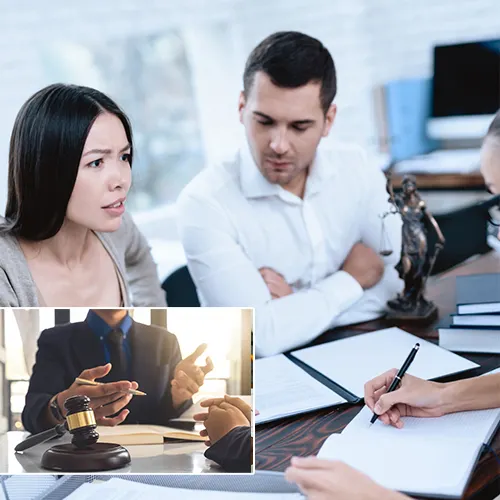Understanding Your Rights: DUI Checkpoint Legality Explained
Table of Contents []
DUI Checkpoint Legality
Understanding DUI Checkpoints and Your Rights

At James Drummond Law Firm PLLC, we recognize that DUI checkpoints can be a source of tension and uncertainty for many drivers. We are dedicated to demystifying the legal nuances of these roadblocks, ensuring that our visitors have access to comprehensive information about their rights, as well as the responsibilities of law enforcement officers. Our main goal is to empower individuals with knowledge so that they can navigate DUI checkpoints confidently and with awareness of their legal protections.
DUI checkpoints, also known as sobriety checkpoints, are police traffic stops that are not tied to specific suspicions. Rather, these checkpoints are setup to deter drunk driving by systematically checking vehicles for signs of impairment. Understanding the legality of DUI checkpoints, and the protocols that law enforcement must adhere to, is essential for ensuring that your constitutional rights are protected during these encounters.
Should you find yourself at a DUI checkpoint, it is important to stay calm and respectful. If you are unsure of how to proceed or feel that your rights may have been violated, reaching out to experienced attorneys can provide you with the guidance you need. With James Drummond Law Firm PLLC, connecting with expert legal counsel is just a phone call away at (405) 818-3851.
The Legality of DUI Checkpoints
While the effectiveness of DUI checkpoints in reducing drunk driving incidents is widely recognized, these stops can also stir up significant legal debate. The Supreme Court has ruled that DUI checkpoints are constitutional if they are conducted within certain guidelines, striking a balance between individual rights and public safety. However, the rules surrounding these checkpoints can vary significantly from state to state.
James Drummond Law Firm PLLC is dedicated to ensuring that our visitors are well-informed on state-specific laws regarding DUI checkpoints. Knowing whether such checkpoints are permissible in your state and how they must be conducted is the first step in understanding your rights on the road.
Your Rights at a Checkpoint
Every driver should know their rights when stopped at a DUI checkpoint. One of the most crucial rights is the protection against unreasonable searches and seizures under the Fourth Amendment. This means that law enforcement must follow strict procedures when stopping vehicles. At James Drummond Law Firm PLLC, we stress the importance of knowing what constitutes a lawful checkpoint encounter.
Additionally, drivers have the right to remain silent and the right to refuse to consent to a search if it is not warranted by probable cause. Should you feel your rights are being compromised, presenting your concerns to the officers calmly and contacting a lawyer should be your next steps. Understanding these rights thoroughly can make a significant difference in the outcome of a DUI checkpoint stop.
What to Expect at a DUI Checkpoint
The experience of going through a DUI checkpoint can vary, but there are generally some common elements you can expect. Law enforcement officers are likely to ask for your driver's license, vehicle registration, and proof of insurance. They might also ask you a few basic questions to gauge whether you show signs of impairment.
At these checkpoints, officers typically look for signs of intoxication such as slurred speech, the smell of alcohol, or visible alcohol containers. If an officer suspects that you are under the influence, you may be asked to perform field sobriety tests or a breathalyzer test. Our resources at James Drummond Law Firm PLLC ensure you know what is and isn't required of you in these situations.
Connecting with Legal Assistance
If you ever find yourself needing legal assistance after an encounter at a DUI checkpoint, James Drummond Law Firm PLLC can connect you with lawyers who specialize in this area. Whether you believe your rights have been violated or you're facing charges related to a DUI stop, it's critical to seek professional advice.
Our team understands that navigating the legal system can be overwhelming, which is why we facilitate access to expert attorneys ready to help. You can easily reach out to us for questions or to book an appointment with a skilled attorney at (405) 818-3851. Our network of legal professionals is equipped to provide you with the representation and advice you need to defend your rights.
Procedure and Protocol for DUI Checkpoints

At the heart of DUI checkpoint operations are the precise procedures and protocols that law enforcement must follow to ensure that the checkpoints meet the legal standards set forth by the government. Our team at James Drummond Law Firm PLLC provides in-depth resources that can help the public understand these critical procedures. Being informed about what is expected from law enforcement at these checkpoints not only helps protect your rights but also aids in fostering transparency and trust between the public and police officers.
It is vital for drivers to recognize that there are guidelines that officers must adhere to, such as having a predetermined plan for stopping vehicles, to prevent arbitrary and discriminatory enforcement. These plans often involve stopping vehicles in a specific sequence, such as every third or fifth vehicle, to ensure fairness and impartiality. When checkpoints are set up and run correctly, they are an important tool in the efforts to reduce drunk driving incidents.
Checkpoint Planning and Public Notice
A key component of lawful DUI checkpoint operations is the advance planning and notice to the public. Many jurisdictions require that law enforcement agencies provide public notice before setting up a checkpoint, which is aimed at increasing the deterrent effect and maintaining transparency. James Drummond Law Firm PLLC recognizes the importance of this aspect and provides resources to help drivers stay informed about upcoming checkpoints.
Learning about planned DUI checkpoints in advance not only serves as a deterrent for those who might consider driving under the influence but also prepares other drivers for possible delays or detours. Transparency in checkpoint operations not only builds public trust but also supports the legal foundation of these traffic stops.
Conducting a Lawful Checkpoint Stop
Officers conducting a DUI checkpoint are expected to carry out their duties in a manner that respects the rights of the individuals they encounter. This includes behaving professionally, having a neutral attitude, and not allowing personal biases to influence their actions. At James Drummond Law Firm PLLC, we advocate for drivers being aware of the standards to which officers are held, so they can recognize and assert their rights if necessary.
During a checkpoint stop, it is important for the officers to limit the duration of each interaction to the minimum time required to check for signs of impairment. If no signs are evident, the driver should be allowed to proceed without undue delay. Understanding these expectations can prepare drivers for what constitutes a lawful and respectful checkpoint experience.
Proper Documentation and Record Keeping
After every DUI checkpoint, law enforcement agencies are responsible for documenting the procedures followed and the outcomes of the stops. This data often includes the number of vehicles stopped, the number of arrests made, and any other relevant observations. Such documentation is crucial for ensuring accountability and for addressing any legal challenges that may arise.
Keeping accurate records is not just a bureaucratic step; it's a fundamental part of maintaining the integrity of DUI checkpoints and upholding the rights of those passing through them. At James Drummond Law Firm PLLC, we encourage drivers to be aware of their right to access these public records, as they are an important resource for anyone seeking to confirm that proper procedures were followed during a checkpoint they encountered.
Exercising Your Rights During a Stop
Empowering drivers to exercise their rights responsibly at DUI checkpoints is a core mission for us at James Drummond Law Firm PLLC. Being armed with knowledge about your rights can significantly impact the interaction with law enforcement, and it may influence the outcome of the stop. It's crucial to remember that while you have rights, there are also responsibilities both you and the officer have to uphold.
Some practical ways to exercise your rights include politely declining voluntary searches when there's no probable cause or calmly asserting your right to remain silent when appropriate. Should you feel these rights have been infringed upon, note the details of the incident and reach out to (405) 818-3851 as soon as possible for legal advice and support. Knowing how to exercise your rights will leave you prepared and composed if you are stopped at a DUI checkpoint.
When DUI Checkpoints Become Controversial

DUI checkpoints are intended to serve as a deterrent and a method to remove impaired drivers from the road. However, they can also become the center of controversy, especially when they are perceived to infringe on personal freedoms or are misused by law enforcement. At James Drummond Law Firm PLLC, we understand the concern that can arise around these checkpoints. In providing our resources, we aim to address these concerns by clarifying the legal boundaries and rights involved in these law enforcement strategies.
One common area of contention is the perceived impact on personal privacy. While public safety is of paramount importance, it should not come at the expense of individual rights. This is why it is essential that checkpoints follow all legal requirements to the letter, ensuring that personal liberties are preserved while also promoting road safety.
Privacy Concerns at Checkpoints
The balance between public safety measures and individual privacy is a delicate one. Checkpoints, by their nature, involve law enforcement interaction with citizens who are not under suspicion of any specific crime. We believe it's crucial to understand that while law enforcement has the authority to conduct these stops, there are constitutional limitations designed to protect your privacy.
To alleviate privacy concerns, officers at DUI checkpoints are typically not permitted to conduct extensive searches of a vehicle or its occupants without probable cause. Recognizing what constitutes probable cause is an important facet of understanding your privacy rights. At James Drummond Law Firm PLLC, we are committed to providing information that helps clarify these legal standards.
Issues of Discrimination and Profiling
An issue that can arise at DUI checkpoints is the accusation of racial profiling or targeting specific groups of individuals. It is essential for all DUI checkpoint operations to be carried out without discrimination and in accordance with predetermined guidelines. At James Drummond Law Firm PLLC, we focus on informing the public about what constitutes profiling and how to identify and respond to it.
If you believe that a DUI checkpoint was targeting specific demographics, or that procedures were applied unjustly, it is imperative to speak up and seek legal counsel. Understanding the signs of profiling and knowing the right steps to take ensures that checkpoints remain fair and focused on the larger goal of public safety.
Concerns About Efficiency and Effectiveness
Another topic of debate surrounding DUI checkpoints is their overall effectiveness in deterring and catching impaired drivers. Critics argue that these checkpoints use significant resources for relatively few arrests. We take these concerns into consideration and provide a balanced perspective on the purpose and outcomes of DUI checkpoints.
Despite the debate, studies have shown that checkpoints can indeed reduce DUI incidents. Yet, we believe that effectiveness should not sacrifice legality or ethics. At James Drummond Law Firm PLLC, we aim to equip our visitors with knowledge about the statistical impact of DUI checkpoints as well as their legal justifications so they can form well-rounded opinions on the matter.
Legal Challenges and Supreme Court Decisions
Over the years, DUI checkpoints have faced numerous legal challenges that have made their way to the Supreme Court. The rulings of these cases have shaped the way checkpoints are conducted today. We ensure that our visitors are informed on key Supreme Court decisions that have upheld the constitutionality of DUI checkpoints while also defining the scope of their legality.
Understanding these pivotal legal cases allows drivers to grasp the legal precedent behind checkpoint operations, and provides insight into why certain procedures are in place. Staying informed on these decisions and knowing how they affect your rights is something we at James Drummond Law Firm PLLC boldly support.
DUI Checkpoints: Preparing for a Safe Encounter

While DUI checkpoints may cause apprehension for many drivers, being prepared can make the experience much less stressful. At James Drummond Law Firm PLLC, we provide thorough guides and advice to ensure that drivers know exactly what to expect and how to conduct themselves during a checkpoint encounter. Our resources are crafted with the intention of fostering a safe and lawful interaction for both drivers and law enforcement officers alike.
An informed driver is a prepared driver. That is why we emphasize the importance of understanding the procedural aspects of DUI checkpoints before you are in one. Knowing what documents to have ready, how to comport oneself, and the appropriate responses can significantly ease the encounter.
What to Keep in Your Vehicle
Before approaching a DUI checkpoint, make sure you have all necessary documents handy. This usually includes your driver's license, vehicle registration, and proof of insurance. Having these documents easily accessible can expedite the checkpoint process and minimize the time you are stopped. We recommend keeping these important items in a location that allows for quick retrieval without causing unnecessary movement in your vehicle.
Preparation extends beyond having your documents ready. It also involves knowing what safety items you should have in your car, such as road flares or a first aid kit, in case of an unrelated emergency. Staying prepared is not only practical but also demonstrates responsible driving practices, which can make a positive impression during a checkpoint stop.
Behaving Appropriately at a Checkpoint
Your behavior at a DUI checkpoint can have a significant impact on the encounter. We advocate for being polite, calm, and compliant with reasonable requests. Avoid sudden movements, and keep your hands visible, typically on the steering wheel, when speaking to officers. These actions promote a safe and respectful interaction, paving the way for a smoother checkpoint experience.
Additionally, knowing your rights can help you interact with confidence. While you should cooperate with lawful instructions, you also have the right to decline to answer certain types of questions. James Drummond Law Firm PLLC is here to offer guidance on how to assert your rights courteously if the situation arises.
Navigating Sobriety Testing
Sobriety tests may be requested if an officer suspects that you might be under the influence of alcohol or drugs. It is important to know what types of sobriety tests you may encounter and what your rights are in regards to these tests. We provide information on both field sobriety tests and chemical tests, such as breathalyzers, to help you make informed decisions if asked to participate in these screenings.
While refusal to submit to certain sobriety tests can have legal consequences, such as license suspension, being informed about these implications beforehand allows drivers to weigh their options thoroughly. Our commitment at James Drummond Law Firm PLLC is to ensure you are prepared to handle these situations knowledgeably and confidently.
Tips for a Smooth Checkpoint Experience
- Approach the checkpoint at a reduced speed and follow any signs or officer signals.
- Have your window rolled down and documents ready as you arrive at the stop.
- Keep your answers concise and polite if questioned by officers.
- Maintain a calm demeanor and avoid engaging in confrontational behavior.
Following these tips can greatly contribute to a smooth checkpoint interaction. By being courteous and prepared, you can help ensure that not only will your rights be respected, but also that the checkpoint can serve its intended purpose without unnecessary conflict.
Connect with James Drummond Law Firm PLLC for Further Guidance

James Drummond Law Firm PLLC is dedicated to providing valuable information and resources on the complex subject of DUI checkpoints. We acknowledge the critical role that these checkpoints play in road safety, as well as the importance of safeguarding individual rights. Our comprehensive resources are designed to educate the public and facilitate informed and confident encounters with DUI checkpoints.
If you have questions, need clarification on DUI checkpoint procedures, or require legal representation, please do not hesitate to reach out to us. Our team of experts is ready to assist you with thoughtful advice and can connect you with seasoned attorneys in the field. For all inquiries and to book an appointment, call us at (405) 818-3851. Let us guide you through any concerns you may have about DUI checkpoints and ensure that you have the support you need when it matters most.
In closing, remember that our ultimate goal is to empower you. We aim for you to move forward as a well-informed driver, understand the laws that apply to DUI checkpoints, and protect your rights with confidence. You can count on [James Drummond Law Firm PLLC] for expert knowledge, invaluable resources, and professional legal connections, all designed to serve you, nationally. Call us today at (405) 818-3851, and take the first step towards being prepared and protected.
